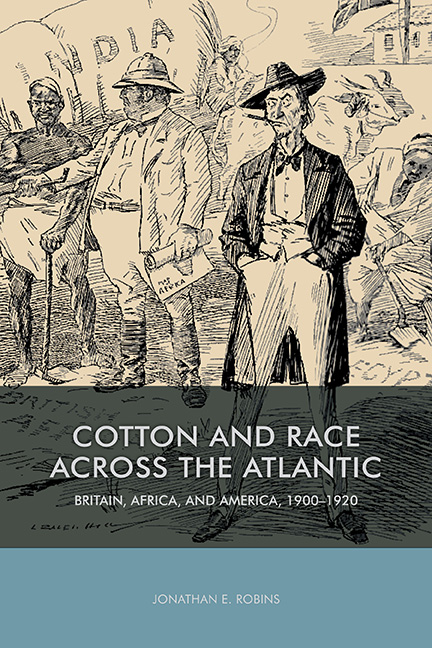Book contents
- Frontmatter
- Contents
- List of Illustrations
- Preface
- Abbreviations
- Introduction
- 1 The Cotton Crisis: Lancashire, the American South, and the Turn to “Empire Cotton”
- 2 “The Black Man's Crop”: The British Cotton Growing Association and Africa
- 3 “The Scientific Redemption of Africa”: Coercion and Regulation in Colonial Agriculture
- 4 “King Cotton's Impoverished Retinue”: Making Cotton a “White Man's Crop” in the American South
- 5 Cotton, Development, and the “Imperial Burden”
- Notes
- Bibliography
- Index
2 - “The Black Man's Crop”: The British Cotton Growing Association and Africa
Published online by Cambridge University Press: 13 July 2019
- Frontmatter
- Contents
- List of Illustrations
- Preface
- Abbreviations
- Introduction
- 1 The Cotton Crisis: Lancashire, the American South, and the Turn to “Empire Cotton”
- 2 “The Black Man's Crop”: The British Cotton Growing Association and Africa
- 3 “The Scientific Redemption of Africa”: Coercion and Regulation in Colonial Agriculture
- 4 “King Cotton's Impoverished Retinue”: Making Cotton a “White Man's Crop” in the American South
- 5 Cotton, Development, and the “Imperial Burden”
- Notes
- Bibliography
- Index
Summary
Whether planted in West Africa or in any other part of the world, cotton of any variety other than Sea Island must necessarily be a black man's crop. The return per acre is not sufficient to adequately remunerate white men.
—William Howarth, Lancashire cotton spinner and BCGA memberAll of the imperial powers of Europe were affected by instability in the American cotton supply and looked for ways to end America's monopoly on long-staple cotton. British, French, German, Belgian, Italian, Dutch, Portuguese, Russian, and Japanese cotton manufacturers hoped that their nations’ colonies could replace America as a source of long-staple cotton. While cotton could be grown in Asia and the Americas, Africa attracted the most attention from imperial powers. This chapter explains why Africa appealed to cotton manufacturers and colonial development planners, and why the British Cotton Growing Association invested so heavily in the continent at the expense of India and other parts of the British Empire. The chapter then examines the BCGA's plans for cotton growing, comparing its strategies to those of its French and German counterparts. While all of the colonial cotton programs exchanged ideas about cotton growing, the BCGA was uniquely burdened by its semiphilanthropic orientation and private-sector status, and its struggles to raise capital in Britain limited its ability to implement projects in Africa.
Three themes connect this chapter and the next. First, the chapters show a clear disconnect between metropolitan interests and colonial decision- making. While Lancashire and the British government claimed to be in full support of “empire cotton,” the BCGA received little investment. As a class, British capitalists were apathetic toward the entire cotton-growing enterprise. A few private cotton companies were fl oated during and after the Sully corner, but only one (the Sudan Plantations Syndicate) operated for more than a few years. On the other hand, Lancashire had little infl uence on the BCGA's plans. British cotton manufacturers and workers were shut out of the BCGA executive committee and made no effort to dictate what kind of cotton the BCGA should pursue, or where and how it should be cultivated. Instead, one man's preoccupation with finding a Britishcontrolled replacement for American long-staple cotton drove most of the BCGA's decisions.
- Type
- Chapter
- Information
- Cotton and Race across the AtlanticBritain, Africa, and America, 1900–1920, pp. 72 - 115Publisher: Boydell & BrewerPrint publication year: 2016



